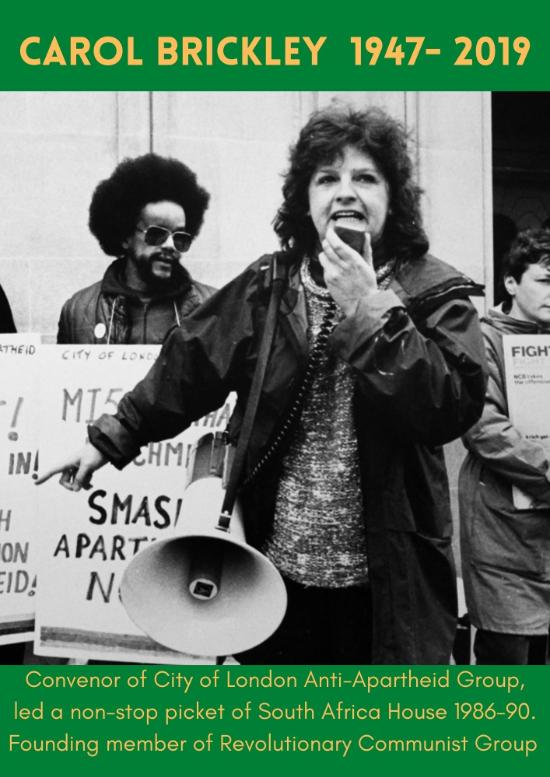Dorothy Nyembe 1931-1998 and Lillian Ngoyi 1911-1980
These two women played a leading role in the anti-apartheid struggle in South Africa, including leading the women’s anti-pass march of 1956.
Dorothy Nomzansi Nyembe joined the African National Congress (ANC) in 1952 at the age of 21. She participated as a volunteer in the Defiance Campaign in Durban and was imprisoned briefly on two occasions. In 1954 she participated in the establishment of the ANC Women’s League in Cato Manor and was one of the leaders against the forced removals after Cato Manor was declared a ‘white group area’ in 1958. As President of the ANC Women’s League in Natal and a leading member of the Federation of South African Women. Dorothy was active in the potato boycott in 1959, called in protest against the use and treatment of prison labourers on potato farms in the Transvaal. In 1962 Dorothy became President of the Natal Rural Areas Committee where she participated in the organisation of anti-government demonstrations by rural women, including their refusal to fill cattle dips. The campaign became known as the Natal Women’s Revolt. In 1963, Dorothy was arrested and charged with furthering the aims of the banned ANC and she was sentenced to three years’ imprisonment. Then in 1968 she was sentenced to 15 years’ imprisonment. South Africa’s longest-serving woman political prisoner, she endured conditions often worse than those for incarcerated African men. She was released in 1984 and then played a leading role in community organisations fighting against rent increases, transport costs, poor education and lack of childcare facilities. In 1994 after the first elections after apartheid, she was one of the pioneer Members of the National Assembly.
Lillian Masediba Ngoyi became a leading figure of the Garment Workers Union and joined the ANC in 1950 as part of the ‘Defiance campaign’ which saw black South Africans defy apartheid laws and regulations to use ‘white only’ facilities. During this time, 8,000 black people were arrested including Lillian who was arrested for using facilities in a post office that were reserved for white people. Her energy and prowess as a public speaker won her rapid recognition, and within a year of joining the ANC she was elected as president of the ANC Women’s League. When the Federation of South African Women (FEDSAW) was formed in 1954, she became one of its national vice-presidents, and in 1956 she was elected president. Recognising the importance of building international solidarity against apartheid, Lilian Ngoyi undertook an illegal journey in 1955 to Lausanne Switzerland to participate in the World Congress of Mothers organised by the Women’s International Democratic Federation. She stowed away in a boat leaving Cape Town, defied segregated seating on a London Bound plane and gained entry into Britain under the pretext of ‘Bible studies’. She then addressed protests and met with activist groups across England, Germany, Switzerland, Romania, China and Russia before returning to South Africa a wanted woman. In December 1956, Ngoyi and Nyembe were arrested for high treason along with 156 other leading figures including Nelson Mandela. After a four-year long trial all defendants were found not guilty, though during the trial Ngoyi spent five months in solitary confinement.
From 1962 she was subjected to a string of banning orders over 15 years, confining her to the township of Orlando, forbidding her to attend any gatherings. During this time, she struggled to earn a decent living and support her family. On 13 March 1980 at the age of 69 she suffered heart trouble and died. However her legacy lives on, she is known as the ‘mother of the black resistance’
Women’s anti-pass march 1956
On 9 August 1956, Ngoyi and Nyembe, amongst other prominent women including Helen Joseph, Albertina Sisulu and Sophia Williams-De Bruyn. led the women’s anti-pass march to the Government Headquarters and Presidential office in Pretoria. Pass laws were a form of an internal passport system enforcing segregation and discrimination of black South Africans. The protest was against the introduction of passes for women and is known as one of the largest demonstrations staged in South African history. Holding thousands of petitions in one hand, Ngoyi knocked on Prime Minister Strijdom’s door to hand over the petitions. Whilst marching, the women sang ‘Wathint’ abafazi’ – ‘you strike the women, you strike a rock, you will be crushed, you will die.’
South Africa’s National Women’s Day is celebrated on 9 August in recognition of the historic march.
(see https://www.sahistory.org.za/people/dorothy-nomzansi-nyembe and https://www.sahistory.org.za/people/lilian-masediba-ngoyi





